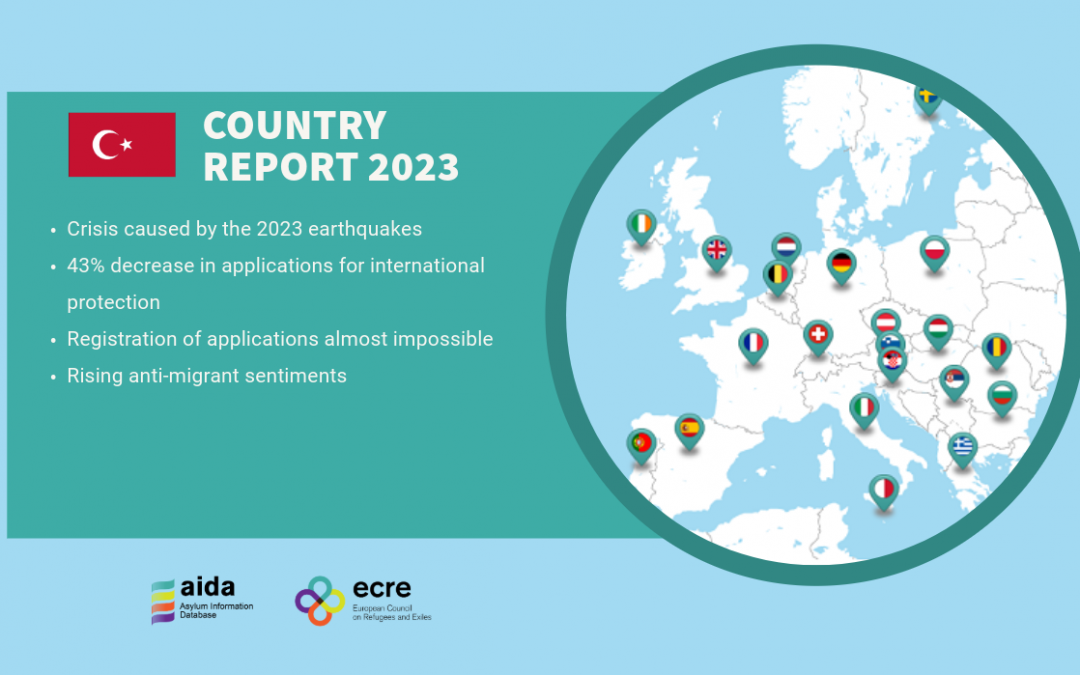The updated AIDA Country Report on Türkiye provides a detailed overview of legislative and practice-related developments in asylum procedures, reception conditions, detention of asylum seekers and content of international protection in 2023.
In 2023, 19,017 applications for international protection were made in Türkiye (43% decrease compared to 2022). The main countries of origin of applicants were Afghanistan (13,068), Iraq (2,776) and Iran (1,416).
There was a substantial shift towards integrated border management to address irregular arrivals in 2023. The construction of border control facilities, including 1,234 km of patrol roads, on 80% of the borders with Iran and Syria was completed. According to Turkish authorities, the facilities prevented 203,437 irregular arrivals during the first 11 months of 2023. Unfortunately, the increase in the number of controls at border crossings also resulted in a corresponding increase in the number of attempted crossings via more dangerous routes. Pushbacks continued in 2023 and the victims were mainly single men from Afghanistan, Pakistan and Bangladesh. In some cases, it was reported that individuals were held for months before being subjected to pushbacks. In addition, there were worrying reports of migrants being caught and beaten by organised groups on the Iranian side of the border.
The registration of applications remained one of the most significant barriers to people seeking international protection in Türkiye in 2023, and it was reportedly “almost impossible” for vulnerable applicants in a number of areas. The difficulties were notably created by the closure of new registrations in 1,169 neighbourhoods in 63 provinces in which the foreign population exceeded 20% of the Turkish population. In addition to the registration problems, address verification procedures continued for both international and temporary protection (TP) holders. These issues led to an increasing number of people becoming undocumented.
Regarding detention, the number of transfers between detention centres increased in 2023. The practice of sudden transfers without previous communications was particularly problematic and affected people’s right to access a legal remedy as lawyers were unable to locate their clients due to the authorities failing to share information on their whereabouts.
In 2023, the main concerns related to migration and asylum were the effects of the devastating earthquakes that increased the need for humanitarian aid in an area in which almost 1.7 million Syrian of TP beneficiaries were hosted. According to official estimates, approximately 50,000 people, including 7,000 Syrians who were TP holders, lost their lives, more than half a million buildings, including houses, workplaces, schools, hospitals, and government offices, were damaged, and significant financial losses were incurred. One year after the earthquakes, the effects are still being felt as some families are still unable to access basic needs, including water and shelter. As a result, the United Nations Refugee Agency (UNHCR) expedited resettlement processing of the most vulnerable refugees, particularly unaccompanied children and women at risk in earthquake-affected locations. More than 16,800 resettlement submissions were made in 2023, 94% of which were from the earthquake region.
Anti-migrant sentiments increased noticeably in the country in 2023, largely due to the crisis caused by the earthquakes. The 2023 general election campaign was centred on topics such as voluntary return, “unwanted immigrants” and border protection, and this created increased challenges for migrant and refugee communities.
The full report is available here.
For more information about the AIDA database or to read other AIDA reports, please visit the AIDA website.

